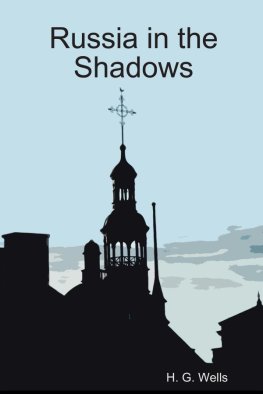Herbert Wells - The New Machiavelli
Here you can read online Herbert Wells - The New Machiavelli full text of the book (entire story) in english for free. Download pdf and epub, get meaning, cover and reviews about this ebook. genre: Prose. Description of the work, (preface) as well as reviews are available. Best literature library LitArk.com created for fans of good reading and offers a wide selection of genres:
Romance novel
Science fiction
Adventure
Detective
Science
History
Home and family
Prose
Art
Politics
Computer
Non-fiction
Religion
Business
Children
Humor
Choose a favorite category and find really read worthwhile books. Enjoy immersion in the world of imagination, feel the emotions of the characters or learn something new for yourself, make an fascinating discovery.

- Book:The New Machiavelli
- Author:
- Genre:
- Rating:4 / 5
- Favourites:Add to favourites
- Your mark:
- 80
- 1
- 2
- 3
- 4
- 5
The New Machiavelli: summary, description and annotation
We offer to read an annotation, description, summary or preface (depends on what the author of the book "The New Machiavelli" wrote himself). If you haven't found the necessary information about the book — write in the comments, we will try to find it.
The New Machiavelli — read online for free the complete book (whole text) full work
Below is the text of the book, divided by pages. System saving the place of the last page read, allows you to conveniently read the book "The New Machiavelli" online for free, without having to search again every time where you left off. Put a bookmark, and you can go to the page where you finished reading at any time.
Font size:
Interval:
Bookmark:
THE NEW MACHIAVELLI
by H. G. Wells
BOOK THE FIRST
THE MAKING OF A MAN
CHAPTER THE FIRST
CONCERNING A BOOK THAT WAS NEVER WRITTEN
1
Since I came to this place I have been very restless, wasting my energies in the futile beginning of ill-conceived books. One does not settle down very readily at two and forty to a new way of living, and I have found myself with the teeming interests of the life I have abandoned still buzzing like a swarm of homeless bees in my head. My mind has been full of confused protests and justifications. In any case I should have found difficulties enough in expressing the complex thing I have to tell, but it has added greatly to my trouble that I have a great analogue, that a certain Niccolo Machiavelli chanced to fall out of politics at very much the age I have reached, and wrote a book to engage the restlessness of his mind, very much as I have wanted to do. He wrote about the relation of the great constructive spirit in politics to individual character and weaknesses, and so far his achievement lies like a deep rut in the road of my intention. It has taken me far astray. It is a matter of many weeks nowdiversified indeed by some long drives into the mountains behind us and a memorable sail to Genoa across the blue and purple waters that drowned Shelleysince I began a laboured and futile imitation of "The Prince." I sat up late last night with the jumbled accumulation; and at last made a little fire of olive twigs and burnt it all, sheet by sheetto begin again clear this morning.
But incidentally I have re-read most of Machiavelli, not excepting those scandalous letters of his to Vettori, and it seems to me, now that I have released myself altogether from his literary precedent, that he still has his use for me. In spite of his vast prestige I claim kindred with him and set his name upon my title-page, in partial intimation of the matter of my story. He takes me with sympathy not only by reason of the dream he pursued and the humanity of his politics, but by the mixture of his nature. His vices come in, essential to my issue. He is dead and gone, all his immediate correlations to party and faction have faded to insignificance, leaving only on the one hand his broad method and conceptions, and upon the other his intimate living personality, exposed down to its salacious corners as the soul of no contemporary can ever be exposed. Of those double strands it is I have to write, of the subtle protesting perplexing play of instinctive passion and desire against too abstract a dream of statesmanship. But things that seemed to lie very far apart in Machiavelli's time have come near to one another; it is no simple story of white passions struggling against the red that I have to tell.
The state-making dream is a very old dream indeed in the world's history. It plays too small a part in novels. Plato and Confucius are but the highest of a great host of minds that have had a kindred aspiration, have dreamt of a world of men better ordered, happier, finer, securer. They imagined cities grown more powerful and peoples made rich and multitudinous by their efforts, they thought in terms of harbours and shining navies, great roads engineered marvellously, jungles cleared and deserts conquered, the ending of muddle and diseases and dirt and misery; the ending of confusions that waste human possibilities; they thought of these things with passion and desire as other men think of the soft lines and tender beauty of women. Thousands of men there are to-day almost mastered by this white passion of statecraft, and in nearly every one who reads and thinks you could find, I suspect, some sort of answering response. But in every one it presents itself extraordinarily entangled and mixed up with other, more intimate things.
It was so with Machiavelli. I picture him at San Casciano as he lived in retirement upon his property after the fall of the Republic, perhaps with a twinge of the torture that punished his conspiracy still lurking in his limbs. Such twinges could not stop his dreaming. Then it was "The Prince" was written. All day he went about his personal affairs, saw homely neighbours, dealt with his family, gave vent to everyday passions. He would sit in the shop of Donato del Corno gossiping curiously among vicious company, or pace the lonely woods of his estate, book in hand, full of bitter meditations. In the evening he returned home and went to his study. At the entrance, he says, he pulled off his peasant clothes covered with the dust and dirt of that immediate life, washed himself, put on his "noble court dress," closed the door on the world of toiling and getting, private loving, private hating and personal regrets, sat down with a sigh of contentment to those wider dreams.
I like to think of him so, with brown books before him lit by the light of candles in silver candlesticks, or heading some new chapter of "The Prince," with a grey quill in his clean fine hand.
So writing, he becomes a symbol for me, and the less none because of his animal humour, his queer indecent side, and because of such lapses into utter meanness as that which made him sound the note of the begging-letter writer even in his "Dedication," reminding His Magnificence very urgently, as if it were the gist of his matter, of the continued malignity of fortune in his affairs. These flaws complete him. They are my reason for preferring him as a symbol to Plato, of whose indelicate side we know nothing, and whose correspondence with Dionysius of Syracuse has perished; or to Confucius who travelled China in search of a Prince he might instruct, with lapses and indignities now lost in the mists of ages. They have achieved the apotheosis of individual forgetfulness, and Plato has the added glory of that acquired beauty, that bust of the Indian Bacchus which is now indissolubly mingled with his tradition. They have passed into the world of the ideal, and every humbug takes his freedoms with their names. But Machiavelli, more recent and less popular, is still all human and earthly, a fallen brotherand at the same time that nobly dressed and nobly dreaming writer at the desk.
That vision of the strengthened and perfected state is protagonist in my story. But as I re-read "The Prince" and thought out the manner of my now abandoned project, I came to perceive how that stir and whirl of human thought one calls by way of embodiment the French Revolution, has altered absolutely the approach to such a question. Machiavelli, like Plato and Pythagoras and Confucius two hundred odd decades before him, saw only one method by which a thinking man, himself not powerful, might do the work of state building, and that was by seizing the imagination of a Prince. Directly these men turned their thoughts towards realisation, their attitudes becamewhat shall I call it?secretarial. Machiavelli, it is true, had some little doubts about the particular Prince he wanted, whether it was Caesar Borgia of Giuliano or Lorenzo, but a Prince it had to be. Before I saw clearly the differences of our own time I searched my mind for the modern equivalent of a Prince. At various times I redrafted a parallel dedication to the Prince of Wales, to the Emperor William, to Mr. Evesham, to a certain newspaper proprietor who was once my schoolfellow at City Merchants', to Mr. J. D. Rockefellerall of them men in their several ways and circumstances and possibilities, princely. Yet in every case my pen bent of its own accord towards irony becausebecause, although at first I did not realise it, I myself am just as free to be a prince. The appeal was unfair. The old sort of Prince, the old little principality has vanished from the world. The commonweal is one man's absolute estate and responsibility no more. In Machiavelli's time it was indeed to an extreme degree one man's affair. But the days of the Prince who planned and directed and was the source and centre of all power are ended. We are in a condition of affairs infinitely more complex, in which every prince and statesman is something of a servant and every intelligent human being something of a Prince. No magnificent pensive Lorenzos remain any more in this world for secretarial hopes.
Font size:
Interval:
Bookmark:
Similar books «The New Machiavelli»
Look at similar books to The New Machiavelli. We have selected literature similar in name and meaning in the hope of providing readers with more options to find new, interesting, not yet read works.
Discussion, reviews of the book The New Machiavelli and just readers' own opinions. Leave your comments, write what you think about the work, its meaning or the main characters. Specify what exactly you liked and what you didn't like, and why you think so.


